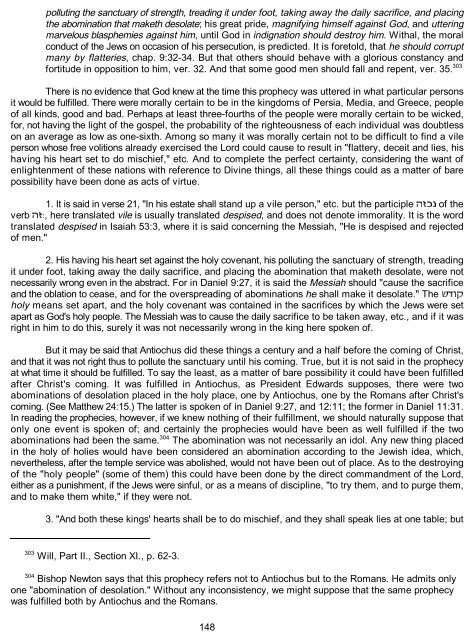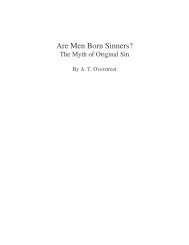Foreknowledge by Joel Hayes - Library of Theology
Foreknowledge by Joel Hayes - Library of Theology
Foreknowledge by Joel Hayes - Library of Theology
Create successful ePaper yourself
Turn your PDF publications into a flip-book with our unique Google optimized e-Paper software.
polluting the sanctuary <strong>of</strong> strength, treading it under foot, taking away the daily sacrifice, and placing<br />
the abomination that maketh desolate; his great pride, magnifying himself against God, and uttering<br />
marvelous blasphemies against him, until God in indignation should destroy him. Withal, the moral<br />
conduct <strong>of</strong> the Jews on occasion <strong>of</strong> his persecution, is predicted. It is foretold, that he should corrupt<br />
many <strong>by</strong> flatteries, chap. 9:32-34. But that others should behave with a glorious constancy and<br />
fortitude in opposition to him, ver. 32. And that some good men should fall and repent, ver. 35. 303<br />
There is no evidence that God knew at the time this prophecy was uttered in what particular persons<br />
it would be fulfilled. There were morally certain to be in the kingdoms <strong>of</strong> Persia, Media, and Greece, people<br />
<strong>of</strong> all kinds, good and bad. Perhaps at least three-fourths <strong>of</strong> the people were morally certain to be wicked,<br />
for, not having the light <strong>of</strong> the gospel, the probability <strong>of</strong> the righteousness <strong>of</strong> each individual was doubtless<br />
on an average as low as one-sixth. Among so many it was morally certain not to be difficult to find a vile<br />
person whose free volitions already exercised the Lord could cause to result in "flattery, deceit and lies, his<br />
having his heart set to do mischief," etc. And to complete the perfect certainty, considering the want <strong>of</strong><br />
enlightenment <strong>of</strong> these nations with reference to Divine things, all these things could as a matter <strong>of</strong> bare<br />
possibility have been done as acts <strong>of</strong> virtue.<br />
1. It is said in verse 21, "In his estate shall stand up a vile person," etc. but the participle <strong>of</strong> the<br />
verb , here translated vile is usually translated despised, and does not denote immorality. It is the word<br />
translated despised in Isaiah 53:3, where it is said concerning the Messiah, "He is despised and rejected<br />
<strong>of</strong> men."<br />
2. His having his heart set against the holy covenant, his polluting the sanctuary <strong>of</strong> strength, treading<br />
it under foot, taking away the daily sacrifice, and placing the abomination that maketh desolate, were not<br />
necessarily wrong even in the abstract. For in Daniel 9:27, it is said the Messiah should "cause the sacrifice<br />
and the oblation to cease, and for the overspreading <strong>of</strong> abominations he shall make it desolate." The <br />
holy means set apart, and the holy covenant was contained in the sacrifices <strong>by</strong> which the Jews were set<br />
apart as God's holy people. The Messiah was to cause the daily sacrifice to be taken away, etc., and if it was<br />
right in him to do this, surely it was not necessarily wrong in the king here spoken <strong>of</strong>.<br />
But it may be said that Antiochus did these things a century and a half before the coming <strong>of</strong> Christ,<br />
and that it was not right thus to pollute the sanctuary until his coming. True, but it is not said in the prophecy<br />
at what time it should be fulfilled. To say the least, as a matter <strong>of</strong> bare possibility it could have been fulfilled<br />
after Christ's coming. It was fulfilled in Antiochus, as President Edwards supposes, there were two<br />
abominations <strong>of</strong> desolation placed in the holy place, one <strong>by</strong> Antiochus, one <strong>by</strong> the Romans after Christ's<br />
coming. (See Matthew 24:15.) The latter is spoken <strong>of</strong> in Daniel 9:27, and 12:11; the former in Daniel 11:31.<br />
In reading the prophecies, however, if we knew nothing <strong>of</strong> their fulfillment, we should naturally suppose that<br />
only one event is spoken <strong>of</strong>; and certainly the prophecies would have been as well fulfilled if the two<br />
304<br />
abominations had been the same. The abomination was not necessarily an idol. Any new thing placed<br />
in the holy <strong>of</strong> holies would have been considered an abomination according to the Jewish idea, which,<br />
nevertheless, after the temple service was abolished, would not have been out <strong>of</strong> place. As to the destroying<br />
<strong>of</strong> the "holy people" (some <strong>of</strong> them) this could have been done <strong>by</strong> the direct commandment <strong>of</strong> the Lord,<br />
either as a punishment, if the Jews were sinful, or as a means <strong>of</strong> discipline, "to try them, and to purge them,<br />
and to make them white," if they were not.<br />
3. "And both these kings' hearts shall be to do mischief, and they shall speak lies at one table; but<br />
303<br />
Will, Part II., Section XI., p. 62-3.<br />
304<br />
Bishop Newton says that this prophecy refers not to Antiochus but to the Romans. He admits only<br />
one "abomination <strong>of</strong> desolation." Without any inconsistency, we might suppose that the same prophecy<br />
was fulfilled both <strong>by</strong> Antiochus and the Romans.<br />
148






